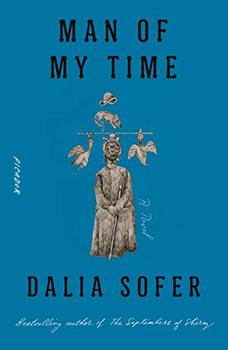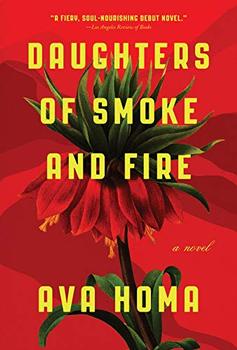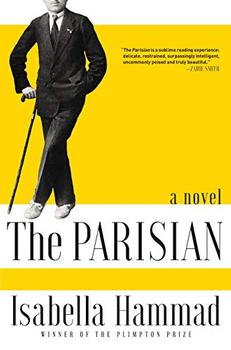Summary | Excerpt | Reviews | Beyond the book | Read-Alikes | Genres & Themes | Author Bio

Covering a range of decades but set against the political backdrop of the 1979 Iranian Revolution, Dalia Sofer's latest novel, Man of My Time, is a quietly powerful retrospective look at the accumulation of moments and choices that form a life. Hamid, a middle-aged ex-interrogator for the Iranian regime, visits New York City on a diplomatic mission in the present day. While there, he meets with his estranged brother and receives a box of their deceased father's ashes, which he agrees to take back to Iran so as to fulfill their father's dying wish to be buried in his homeland.
When I began reading, I thought the novel would focus much more on Hamid's task of repatriating his father's ashes. Although the ashes are key, in that they cause Hamid to reflect on his life, his father's remains play less of a starring role in the rest of the story. Instead, it is the oppressive memory of his father that looms large throughout.
The novel is a bit slow to get started as it switches between the present day and Hamid's memories of his formative years in Iran. An artistic and sensitive child, he is constantly demeaned and ridiculed by his perfectionist, academic father, who likens him to glass: translucent and empty. One particularly heartbreaking passage reveals the emotional callousness of his father, who during a family vacation asks almost nine-year-old Hamid to tell him a story:
"Come on," he said. "You never speak, unless poked. You live in your own absentminded head. Make yourself known, my son! Or at the very least, heard."
When Hamid cannot offer his father a story, the man further humiliates him with the idea that he is nothing:
A vendor approached with cones of ice cream.
"No thank you," my father said to him. "There is no pleasure in eating an ice cream alone." The man looked at me with pity in his eyes, and walked away.
As Hamid matures into a young man, the bitter resentment he feels toward his family, particularly his father, becomes more outwardly noticeable. The intensity of his emotional dissociation from his family mirrors the rising social and political turmoil in an Iran on the cusp of revolution.
While the book has a slow opening, the latter half is intensely gripping, more dynamic and emotionally powerful. Hamid's memories come in shorter bursts, switching rapidly from the present, to his failed marriage and life with his daughter, to his childhood once more. His emotions also become more nuanced—the flush of youth has vanished and is replaced with middle-aged retrospection and regret.
Sofer's prose can at times be more telling than showing; however, overall this works for the story. She has a way of slicing right to the heart of a scene, utilizing unexpected and profound imagery that reminds me a bit of Persian poetry, in which multiple lines might approach a theme in different ways. In one scene, a group of women drinking tea at a cafe becomes a subtle meditation on the physical and emotional spaces between people and how likely it is that we can never truly know another human being:
With their bracelets jingling like wind chimes, they left lip-glossed stains on the rims of tea cups that would soon be washed and refilled and offered to those who would come later in the day, and later still - a succession of washed-out kisses that would never meet.
Sofer tucks innumerable references to works of art, literature and music throughout the novel. Medieval Persian poets mix with Renaissance painters, European Enlightenment thinkers, classic French films, modern Iranian musicians, contemporary writers and Western rock bands to create a sort of artistic-literary soundtrack, providing an added depth to the characters and settings.
In one scene, Hamid is acutely aware that he is adrift and he poignantly reflects on his situation at an outdoor music performance in Tehran:
As I sat listening, music carrying me back to my own beginning, I felt myself a misplaced man. Were I, for instance, some forgotten hat, left behind in a train compartment, or a glove, dropped from a pocket of an unsuspecting traveler, I would no better understand my location in the world.
Hamid is a man whose potential has been stunted by historical circumstance and personal choice, and as I read, my heart ached for him. Man of My Time is a beautiful novel, suffused with the melancholy of a life misled and tiny sparks of hope that the possibility for change exists until the end.
![]() This review was originally published in The BookBrowse Review in April 2020, and has been updated for the
May 2021 edition.
Click here to go to this issue.
This review was originally published in The BookBrowse Review in April 2020, and has been updated for the
May 2021 edition.
Click here to go to this issue.

If you liked Man of My Time, try these:

by Ava Homa
Published 2021
The unforgettable, haunting story of a young woman's perilous fight for freedom and justice for her brother, the first novel published in English by a female Kurdish writer.

by Isabella Hammad
Published 2019
A masterful debut novel by Plimpton Prize winner Isabella Hammad, The Parisian illuminates a pivotal period of Palestinian history through the journey and romances of one young man, from his studies in France during World War I to his return to Palestine at the dawn of its battle for independence.
Discovery consists of seeing what everybody has seen and thinking what nobody has thought.
Click Here to find out who said this, as well as discovering other famous literary quotes!
Your guide toexceptional books
BookBrowse seeks out and recommends the best in contemporary fiction and nonfiction—books that not only engage and entertain but also deepen our understanding of ourselves and the world around us.